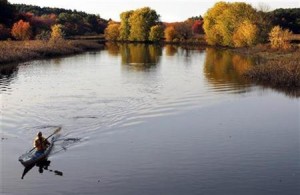DIVERSITAS, Paris
29 Sep 2009
 The world’s rivers are in a crisis of ominous proportions, according to a new global analysis to be published Sept. 30 in the journal Nature.
The world’s rivers are in a crisis of ominous proportions, according to a new global analysis to be published Sept. 30 in the journal Nature.
The report is the first to simultaneously account for the effects on the health of the world’s rivers of such things as pollution, dam building, agricultural runoff, the conversion of wetlands and the introduction of exotic species. The resulting portrait is grim, revealing that nearly 80 percent of humans live in areas where river waters are highly threatened, posing major problems to both human water security and aquatic environments where thousands of species of plants and animals are at risk of extinction.
The report was authored by an international team led by Charles J. Vörösmarty of the City University of New York, an expert on global water resources, and Peter B. McIntyre, a professor of zoology at the University of Wisconsin-Madison’s Center for Limnology and an expert on freshwater biodiversity.
The work underpinning the study was funded by the Earth System Science Partnership, an international scientific consortium that supports research on global environmental change; the Bonn-based Global Water System Project, an interdisciplinary research effort to articulate human-water interactions; and Paris-based DIVERSITAS, an international collaborative whose mission includes providing accurate scientific information related to issues of biodiversity. The work was also supported by the National Science Foundation, NASA, the Global Environmental Facility, and the Society for Conservation Biology’s Smith Fellowship Program.
Full news release, click here
Coverage summary, click here
Sample coverage, by Reuters, click here, by the BBC Online, click here